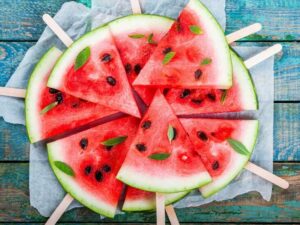Watermelon is a delicious fruit that is enjoyed by people all over the world. It is also said to be beneficial for weight loss and has been nicknamed the “watermelon diet.” But does this diet really work? In this blog post, we will take a closer look at the watermelon diet and find out if it is fact or fiction!
Contents
What Is A Watermelon Diet?
 A watermelon diet is a type of weight loss and detoxification plan that focuses on eating only watermelon to lose weight. The idea behind the diet is that by following a strict regimen of consuming large quantities of only watermelon, you will flush out toxins and reduce your body fat percentage.
A watermelon diet is a type of weight loss and detoxification plan that focuses on eating only watermelon to lose weight. The idea behind the diet is that by following a strict regimen of consuming large quantities of only watermelon, you will flush out toxins and reduce your body fat percentage.
Some versions of the diet suggest eating up to three kilograms of watermelon per day. Additionally, it is recommended to drink plenty of water while on this diet to ensure proper hydration. It is thought that the high amounts of lycopene in watermelon can help boost the immune system and reduce inflammation.
The watermelon diet is not a long-term solution for weight loss. Because it does not provide essential nutrients and calories to sustain a healthy lifestyle. But, the watermelon diet can be used as part of a short-term detoxification or weight loss plan. However, it should not replace other healthful eating habits or proper nutrition.
Is Watermelon Diet A Fact or Fiction?
Many people believe that a watermelon diet can help them lose weight and improve their health. But there are various opinions on whether or not this is true.
Facts
The watermelon diet, also known as a ‘watermelon cleanse’ or ‘watermelon detox’, involves eating nothing but watermelon for a period of time. Some people even go so far as to only drink water with added lemon juice and honey during the cleanse. There are some facts that point to the potential benefits of a watermelon diet:
- Watermelons are low in calories and fat, making them an ideal food choice for weight loss.
- Watermelons contain high amounts of Vitamin A, Vitamin C, and potassium, which can help boost immunity and reduce inflammation.
- The antioxidant lycopene found in watermelons can help protect the skin from sun damage and reduce the risk of certain types of cancer.
Fiction
 While some people may find success with a watermelon diet, it’s important to remember that this type of extreme diet is not sustainable or healthy in the long term.
While some people may find success with a watermelon diet, it’s important to remember that this type of extreme diet is not sustainable or healthy in the long term.
- Eating nothing but watermelon for an extended period of time can leave you feeling lethargic and lacking essential nutrients.
- There is no scientific evidence that eating only watermelon will help you lose weight or improve your health in any meaningful way.
- Watermelon may be a healthy food, but it doesn’t provide all the vitamins and minerals needed for a balanced diet.
Overall, the watermelon diet may provide some short-term health benefits, but it’s not an effective or sustainable way to lose weight or improve your health in the long term. Eating a balanced, nutrient-rich diet and engaging in regular physical activity is the best way to maintain good health.
The watermelon diet is a myth, not a fact. It’s important to talk to your doctor if you are considering trying any kind of extreme diet. They can help you find the best way for you to reach your health and weight loss goals.
What Nutrients Are Present in Watermelon?
When it comes to watermelon nutrition, it packs a powerful punch. Watermelons are an excellent source of vitamins A and C, as well as potassium. They contain some fiber, magnesium, and antioxidants like lycopene.
One cup of watermelon contains the following nutritional content:
- Water: 92%
- Protein: 0.9 grams
- Fat: 0.2 grams
- Carbohydrates: 12 grams
- Fiber: 0.6 grams
- Sugar: 9.6 grams
- Vitamin C: 12.5 mg
- Vitamin A: 43.12 mcg
- Potassium: 172 mg
- Magnesium: 15.40 mg
These nutrients are essential for the body’s health and function, providing a range of benefits such as eye health, improved immunity, better sleep quality, and more. Watermelon is also an excellent source of lycopene, which has antioxidant properties that may help reduce the risk of certain cancers.
So not only does it taste great, but watermelon is a powerhouse of nutrition! Make sure to include this delicious fruit in your diet to reap the many benefits it has to offer.
Does The Watermelon Diet Work?
 If you are trying to weight loss and improve your overall health, then the watermelon diet may be a good option for you. While it is not a miracle diet, following the watermelon diet can help you reach your weight loss goals by providing nutritious foods that are low in calories and fat.
If you are trying to weight loss and improve your overall health, then the watermelon diet may be a good option for you. While it is not a miracle diet, following the watermelon diet can help you reach your weight loss goals by providing nutritious foods that are low in calories and fat.
The watermelon diet focuses on replacing processed and unhealthy foods with fresh fruits, vegetables, lean proteins, and whole grains. These are all foods that provide essential vitamins and minerals for a healthy diet, something that is often missing in processed diets. Additionally, by cutting out unhealthy snacks and replacing them with nutrient-rich watermelon slices, you can help to reduce your overall calorie intake.
When following the watermelon diet, it is important to keep in mind that watermelon is not the only food you should be eating. You should also strive to include a variety of other healthy foods such as lean proteins, whole grains, and plenty of fruits and vegetables. This will help ensure that you are getting all the essential nutrients necessary for a balanced diet.
How Can You Use a Watermelon Diet For Weight Loss?
A watermelon diet is an effective and healthy way to lose weight. The high water content of the fruit helps to keep you hydrated, while its low-calorie content can help you shed some unwanted pounds. Eating a watermelon-rich diet can also be very satisfying, as it’s sweet and filling.
Here are some of the tips to help get you started on the watermelon diet:
- Start off your day with a watermelon smoothie. Blend together a few pieces of ripe watermelon, some ice cubes, and a splash of non-fat milk or yogurt for an energizing start to your day.
- Use diced or sliced fresh watermelon as a topping for salads for a low-calorie, sweet crunch.
- Get creative with watermelon slices and use them to make wraps or pinwheel sandwiches. Stuff your wrap with vegetables such as cucumber, spinach, and tomatoes to get extra nutrients.
- For an evening snack, have fresh watermelon sticks paired with low-fat cheese.
- Freeze diced watermelon in an ice cube tray and then add it to your water bottle for a refreshing twist.
Watermelons are incredibly versatile, so get creative and find ways to incorporate them into your diet as much as possible. As long as you’re making sure that you have plenty of other healthy foods throughout your day, you should be able to successfully use a watermelon diet to help shed some extra weight.
Is One Watermelon a Day Too Much?
 The answer to this question is a bit complicated. Generally speaking, it is best for people to avoid consuming excessive amounts of any one food or beverage, including watermelon. Eating too much of anything can lead to an imbalance in the body’s nutrient levels and can be dangerous.
The answer to this question is a bit complicated. Generally speaking, it is best for people to avoid consuming excessive amounts of any one food or beverage, including watermelon. Eating too much of anything can lead to an imbalance in the body’s nutrient levels and can be dangerous.
For healthy adults, eating one whole watermelon per day is generally considered safe. That said, it is important to note that eating too much watermelon may lead to unwanted side effects such as:
- abdominal discomfort
- diarrhea
- nausea
Additionally, due to the high sugar content of watermelon, eating too much can lead to spikes in blood glucose levels and cause other health issues. Watermelon is a nutrient-rich fruit that can be enjoyed in moderation.
So if you choose to have it as part of your daily diet, make sure to stick to one whole watermelon per day. Also, remember to balance out your diet with other fruits and vegetables as well as other sources of protein and healthy fats. Doing this will help ensure you are consuming all the essential nutrients your body needs while avoiding any potential health risks.
Conclusion
In conclusion, whether the watermelon diet is fact or fiction is a complex topic to tackle. While it is possible to safely incorporate watermelon into a healthy diet, there are some potential risks with excessive consumption. Eating large quantities of watermelon can lead to an increase in blood sugar levels and/or weight gain. So it’s important to monitor your consumption and speak with a doctor about any concerns.
Following a watermelon diet in moderation can be beneficial. Ultimately, the decision to include watermelon in your diet is up to you – just make sure you are aware of the potential risks and benefits!
If you’re interested in learning more, seek the expertise of FitMantra! Our experienced nutritionists will offer personalized support to assist you in achieving your fitness goals. Our online nutrition counseling, and weight loss program has been designed to help you shed those unwanted pounds! Don’t forget to download our Fitness App available on Android.

Hi there! Do you know if they make any plugins to help with Search Engine Optimization? I’m trying to get my blog to rank for some targeted
keywords but I’m not seeing very good results. If you know of any please share.
Appreciate it! I saw similar text here: All escape rooms
diflucan over the counter uk
advair diskus 2018
prescription price checker
where can i buy diflucan without a prescription
best price for effexor 75mg
most reputable canadian pharmacies
flomax nasal congestion
list of canadian pharmacies
where to purchase amoxicillin
strattera order
best discount pharmacy
albuterol 90 mcg inhaler
canadapharmacy com
acyclovir cream discount coupon
tretinoin 0.0125
buy doxycycline south africa
effexor 75 mg tablet
furosemide 400 mg
amoxicillin 500mg without script
purchase retin a
advair diskus 250 price canada
baclofen 10 brand name
lyrica 75 mg coupon
how to get modafinil
amoxicillin 500mg online uk
albuterol 900 mcg
certified canadian pharmacy
buy amoxil
compare ventolin prices
purchase retin a cream online
tretinoin 0.1 gel buy
diflucan 50
generic tretinoin price
generic accutane
buy propecia online australia
furosemide uk
purchase valtrex
[url=https://lyricamd.com/]lyrica cost[/url]